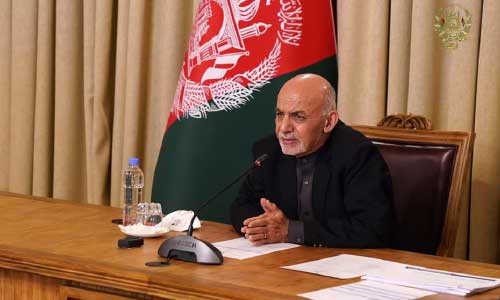KABUL - President Mohammad Ashraf Ghani has said that coronavirus has exacerbated existing gaps and inequalities across the developed and developing nations.
Addressing special session of the United Nations General Assembly (UNGA) in response to the coronnavirus disease, the president said that coronavirus has not been a leveler as expected; but instead, it has exacerbated existing gaps and inequalities across developed and developing nations.
Countries in special situations have been especially hard hit. “For example, we as a poor country, like many others around the globe, were not able to design and implement effective stimulus packages.”
“We also had to be very careful in instituting lockdowns to avoid inflicting serious damage on our economy and peoples’ livelihoods, which could have inflicted more suffering than the virus itself.”
This will continue to be the case even as a vaccine becomes available, because administering a vaccine requires capabilities and infrastructure that poor countries simply do not have. The role of multilateral organizations in the joint distribution of the vaccine will be critical. Our call for the vaccine to be a global public good must be loud and clear.
“Now, the second wave of the pandemic is at our doorstep. We face this wave during the winter season, with very little understanding of how cold weather, particularly under conditions of poverty, will affect the nature of the pandemic.”
“We now know that women have suffered the most as a result of the pandemic, and experienced higher levels of insecurity. Today we must take a strong stand against domestic violence and reaffirm our support for the Secretary-General’s call for peace at home. Ending the shadow pandemic affecting millions of women and girls is critical for a fair and protected world for all.”
The president hoped that “As we enter the second wave, we as an international community will be able to draw from the lessons learned.”
For one, a clear, phased approach needs to be designed and replicated nationally, regionally and globally. This approach should be informed not just by the information provided via instant analysis, but more importantly by patterns that emerge in the way the virus has manifested globally.
“Secondly, now we are in a better position to plan to ensure food security and basic human security in the face of subsequent waves. We must make sure that supply chains that were disrupted during the first wave are either restored or alternatives put in place to ensure basic needs are met.”
“The pandemic transformed the way we do business, the way we communicate, the way we live. But it’s not all negative. COVID pushed the digitalization of the world at a speed that was inconceivable. And moving into subsequent waves of the pandemic, we need to embrace digital technology to further a global dialogue around policy, accessing and distributing the vaccine. To take advantage of these technologies, more must, however, be done to address the digital divide.”
“We will not be able to return to our pre-pandemic ways of communicating and governing. The pandemic opened up new possibilities for coordination and cooperation; for example, tele-medicine and distance learning. We need to embrace this change.”
“Lastly, because the first and second waves have exacerbated structural poverty and increased situational poverty, we must create a common approach to securing livelihoods and ensuring momentum in the economy while also promoting COVID awareness.”
“Afghanistan is located at the heart of Asia. We have many open or semi-open borders and frontiers. This means we can be either a center for spreading the virus, or containing it. We are trying to be the latter, and we hope we can achieve that if we work together as a global community to act upon the lessons learned from the first wave.” (Pajhwok)
Home » Afghanistan » Poor Nations Hit Hard by Coronavirus: Ghani
Poor Nations Hit Hard by Coronavirus: Ghani

